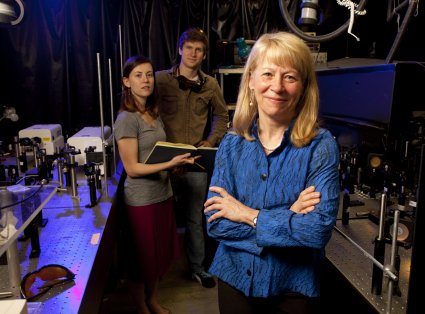Add another honor to the long list of awards and titles bestowed on one of the UO's most acclaimed researchers
 EUGENE, Ore. — Dec. 4, 2014 — The U.S. State Department announced today that chemistry professor and Presidential Chair Geri Richmond of the University of Oregon has been selected as a United States science envoy to work with researchers in other nations on global issues. She was one of four researchers named as science envoys by Secretary of State John Kerry.
EUGENE, Ore. — Dec. 4, 2014 — The U.S. State Department announced today that chemistry professor and Presidential Chair Geri Richmond of the University of Oregon has been selected as a United States science envoy to work with researchers in other nations on global issues. She was one of four researchers named as science envoys by Secretary of State John Kerry.
The State Department has asked Richmond to focus on countries along the Mekong River in Southeast Asia: Thailand, Myanmar, Laos, Vietnam and Cambodia.
"I am so excited and honored to be chosen as the U.S. envoy for this region of the world,” Richmond said. “My recent experiences in working with scientists in developing countries in Africa, Latin America and Southeast Asia has convinced me of the importance of U.S. scientists developing networks and partnerships with the extraordinary talent and energy of scientists in these countries, many of whom are currently experiencing the environmental, water and health problems that foreshadow what we in developing countries will likely face in the future. I can't wait to get started.”
In her role as envoy, she will meet with fellow scientists in the Asian nations to look for new areas for collaboration and ways to “address global challenges and realize shared goals,” the State Department said.
“We are thrilled to learn professor Richmond is once again recognized for excellence in the field of chemistry,” said interim President Scott Coltrane. “She has long been a leader in her discipline and this honor will continue to extend her impact across the globe.”
Joining Richmond in this group of envoys are: Jane Lubchenco, professor of marine biology at Oregon State University and former head of the National Oceanic and Atmospheric Administration, for issues related to marine ecology, environmental science and climate change; Dr. Peter Hotez of the National School of Tropical Medicine at Baylor College of Medicine, an expert in global health and vaccine development, for work focusing on Saudi Arabia and Morocco; and Arun Majumdar of Stanford University's Precourt Institute for Energy, whose focus will be Poland and the Baltic region.
Science envoys travel as private citizens and advise the White House, State Department and the American science community on what they learn on their visits and in their work with foreign scientists and institutions. Richmond has traveled to China and Southeast Asia as both a scientist and to pursue collaborations on related initiatives, including COACh, the Committee on the Advancement of Women Chemists, which she founded.
“In her role as science envoy for the United States, Geri Richmond will be able to advance the causes that are dear to her heart and to our university community: access for all to science education, excellence in research and putting science to work on behalf of humanity,” said W. Andrew Marcus, interim dean of the UO College of Arts and Sciences. “This is an honor she has earned through a lifetime of work and leading by example; it is a privilege to count professor Richmond among my colleagues at the University of Oregon.”
Richmond already has had a rich career of research and service, earning many academic awards for her research while also serving in some of the world’s leading scientific organizations. Earlier this year she was named president-elect of the American Association for the Advancement of Science and will assume the presidency next year.
In an interview following her AAAS election, Richmond spoke about the importance of forging strong connections with scientific communities in developing nations. She said that’s an area where the United States can build goodwill and help nations develop a science and engineering work force to lift their countries.
“I’m particularly keen on how we can use science as a tool for diplomacy so that we can develop strong scientific collaborations that sometimes are difficult to do politically,” she said. “Science oftentimes breaks through the political barriers that keep countries apart, and I feel very strongly that scientific diplomacy is an effective tool and I’m happy also that that’s a high priority for the Obama administration.”
Richmond also serves on the National Science Board and has been a member of a number of national scientific advisory boards, including the U.S. Secretary of Energy’s Hydrogen and Fuel Cell Advisory Committee. She is a member of the National Academy of Sciences and is a fellow of the American Association for the Advancement of Science, the American Academy of Arts and Sciences, the American Physical Society and the American Chemical Society.
Among her many academic awards are the Davisson-Germer Prize for Atomic or Surface Physics from the American Physical Society, the Charles L. Parsons Award from the American Chemical Society and the Spiers Medal from the United Kingdom’s Royal Society of Chemistry.
In 2013, Richmond was named the UO’s Presidential Chair in Science, becoming just the second person to receive a Presidential Chair. She held endowed professorships at the UO since 1998. She earned her doctorate in chemistry at the University of California at Berkeley in 1980 and a bachelor’s in chemistry from Kansas State University in 1975.
Media Contact: Jim Barlow, director of science and research communications, 541-346-3481, jebarlow@uoregon.edu